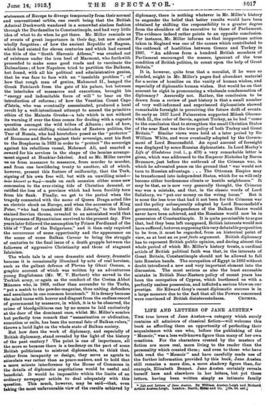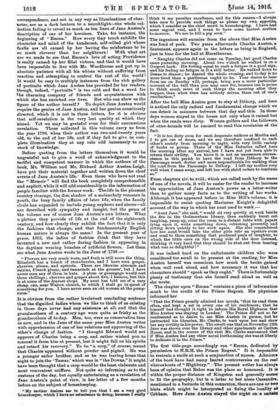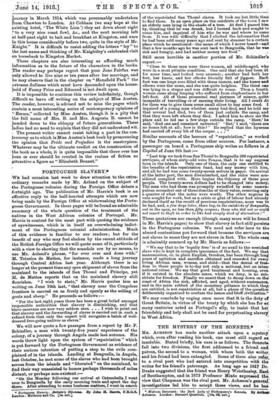LIFE AND LETTERS OF JANE AUSTEN.* THE true lovers of
Jane Austen—a category which surely contains all admirers of classical fiction—will welcome this book as affording them an opportunity of perfecting their acquaintance with one who, before the publishing of the " Memoir," was a less well-known figure than many of her own creations. For the characters created by the masters of fiction are more real, more living to the reader than the personality which created them; and even to those who have both read the " Memoir " and have carefully made use of the further information provided by this book, Jane Austen still remains a more dim, a more shadowy figure than, for example, Elizabeth Bennet. Jane Austen certainly reveals herself here and elsewhere in her letters, but yet these letters, having been written simply as intimate family • Life and Letters of Jane Austen. By William Austen-Leigh and Richard Arthur Austen-Leigh. London, Smith, Elder and Co, ClOw. Oct. net.1
correspondence, and not in any way as illuminations of char- acter, are as a dark lantern to a searchlight—the whole col- lection failing to reveal as much as ten lines of Jane Austen's description of one of her heroines. Take, for instance, the beginning of " Emma." How every tiny touch exhibits the character and mind of the handsome, self-willed girl whose faults are all caused by her having the misfortune to be so much cleverer than her neighbours ! With what art are we made to see that Emma'a love of acting Providence is really caused by her filial virtues, and that it would have been impossible to live with Mr. Woodhouse and put up in absolute patience with all his whims without suffering from reaction and attempting to control the rest of the world!
It would be easy to multiply instances from the rich gallery of portraits which Jane Austen has provided for her readers, though, indeed, " portraits " is too cold and flat a word for the charming company of friends and acquaintances with which she has enriched our lives. But who can show us the figure of the author herself F To depict Jane Austen would require the genius of Jane Austen, and her genius consciously directed, which it is not in these letters, for it is obvious that self-revelation is the very last quality at which they aimed. Yet we may be grateful even for their unconscious revelation. Those collected in this volume carry us from the year 1796, when their author was two-and-twenty years old, to the end of her life, and if they fail to give us com- plete illumination they at any rate add immensely to our stock of knowledge.
Before quoting from the letters themselves it would be ungrateful not to give a word of acknowledgment to the tactful and competent manner in which the authors of the hook, Mr. William and Mr. Richard Arthur Austen-Leigh, have put their material together and written down the chief events of Jane Austen's life.' Even those who have not read the " Memoir" will find the book completely comprehensible and explicit, while it will add considerably to the information of people familiar with the former work. The life in the pleasant country vicarage, the dim shadow of a melancholy romance in youth, the busy family affairs of later life, when the family circle has expanded to include young nephews and nieces—all are described with sympathy and insight, but the gems of the volume are of course Jane Austen's own letters. What a. picture they provide of life at the end of the eighteenth century, and how clearly they exhibit the fact that it is only the fashions that change, and that fundamentally English
human nature is always the same ! In the present year of grace, 1913, the ladies of fashion think that they have
invented a new and rather daring fashion in appearing in the daytime wearing bunches of artificial flowers. Let them see what Jane Austen wrote in the June of 1799 :-
" Flowers are very much worn, and fruit is still more the thing, Elizabeth has a bunch of strawberries, and I have seen grapes. cherries, plums, and apricots. There are likewise almonds and raisins, French plums, and tamarinds at the grocers', but I have never seen any of them in hats. A plum or greengage would cost three shillings ; cherries and grapes about five, I believe, but this is at some of the dearest shops. My aunt has told me of a very cheap one, near Walcot church, to which• I shall go in quest of something for you I have never seen an old woman at the pump- room."
It is obvious from the rather irrelevant concluding sentence that the dignified .ladies whom we like to think of as existing in those days never bad any existence at all, and that the grandmothers of .a century ago were quite an frisky as the grandmothers of fo-day. Men, too, were as conservative then as now, and in the June of the same year Miss Austen writes with apprehension of one of her relations not approving of the Other's change of fashion. "I thought Edward would not approve of Charles being a crop, and rather wished you to conceal it from him at present, lest it might fall on his spirits and retard his recovery." To be "a crop," of course, meant that Charles appeared without powder and pigtail. He was a younger sailor brother, and as he was leaving home that night to join the 'Tamar,' which was in " the Downs," it might have been thought that a crop would be the least elaborate and most convenient coiffure. Not quite so informing as to the customs of the day, but equally entertaining as a revelation of Jane Austen's point of view, is her letter of a few months before on the subject of housekeeping.
"My mother desires sue to tell you that I am a very good housekeeper, which I have no relieetauce in doing, because I really
think it my peculiar excellence, and for this reaSon—I always take care to provide such things as please my own appetite, which I consider as the chief merit in housekeeping. I have had some ragout veal, and I mean to have some haricot mutton to-morrow. We are to kill a pig soon."
The ingenious will surmise from the above that Miss Austen was fond of pork. Two years afterwards Charles Austen, a lieutenant, appears again in the lettere as being in England, just in time for the ball at Hurstbourne.
" Naughty Charles did not come on Tuesday, but good Charles came yesterday morning. About two o'clock he walked in on a Gosport hack. His feeling equal to such a fatigue is a good sign, and his feeling no fatigue in it a still better. He walked down to Deane to dinner ; he danced the whole evening, and to-day is no more tired than a gentleman ought to be. Your desire to hear from me on Sunday will, perhaps, bring you a more particular account of the ball than you may care for, because one is prone to think much more of such things the morning after they happen, than when time has entire?), driven them out of one's recollection."
After the ball Miss Austen goes to stay at Ibthorp, and here is noticed the only radical and fundamental change which we can detect in manners between that day and this. In those days women stayed in the house not only when it rained but when the roads were dirty. Women golfers and the followers of otter-hounds will be amused to read this revelation of the fact.
"It is too dirty even for such desperate walkers as Martha and I to get out of doors, and we are therefore confined to each other's society from morning to night, with very little variety of books or gowns. Three of the Miss Debaries called here the morning after my arrival, but I have not yet been able to return their civility. You know it is not an uncommon circum- stance in this parish to have the road from Ibthorp to the Parsonage much dirtier and more impracticable for walking than the road from the Parsonage to Ibthorp. I left my mother very well when I came away, and left her with strict orders to Continue so."
From chapters xiv. to xviii., which are called each by the name of one of the novels, it will be easier for the reader to increase his appreciation of Jane Austen's power as a letter-writer than to gather many facts as to the writing of her works. Although it has appeared before in Miss Hill's volume, it is impossible to resist quoting Marianne Knight's delightful account of the way in which her aunt used to work:— "Aunt Jane," she said, " would sit very quietly at work beside the fire in the Godmersham library, then suddenly burst out laughing, jump up, cross the room to a distant table with papers lying upon it, write something down, returning presently and sitting down quietly to her work again. She also remembered how her aunt would take the elder girls into an upstairs room and read to them something that produced peals of laughter, to which the little ones on the wrong side of the door listened, thinking it very hard that they should be shut out from hearing what was so delightful !"
It was indeed hard on the unfortunate children who were considered too small to be present at the reading, for Miss Austen herself was conscious how much the books gained when well read aloud, and how necessary it was that her characters should " speak as they ought." There is fortunately plenty of testimony that she herself read aloud as well as
she wrote.
The chapter upon "Emma" contains a piece of information much to the credit of the Prince Regent. His physician informed her
"That the Prince greatly admired her novels, 'that he rand them often, and kept a set in every one of his residences ; that he himself had thought it right to inform His Royal Highness that Miss Austen was staying in London.' The Prince did not so far condescend as to desire to see Miss Austen in person, but he instructed his librarian, Mr. Clarke, to wait upon• her and show her any civility in his power. The result was that on November 13th Jane was shown over the library and other apartments at Carlton House, and in the course of the visit Mr. Clarke announced that if Miss Austen had any other novel forthcoming she was at liberty to dedicate it to the Prince."
The first title-page accordingly ran " Emma, dedicated by permission to H.R.H. the Prince Regent." It is impossible to restrain a smile at such a conjunction of names. Admirers of the book have had many heated controversies on the real whereabouts of " Highbury."_, The present writer has always
been of opinion that Esher was the place so honoured. It is
within the proper distance of Kingston and generally seems to fit the geography, but in a letter to her niece Cassandra, mentioned in a footnote in this connexion, there are one or twd hints which might be interpreted as fixing the locality at Cobham. Here Jane •Austen 'stayed the night on a ceded fromin March 1814, which was presumably undertaken from Chawton to London. At Cobham (we may hope at the existing hotel, ' The White Lion') they sat down about eight "to a very nice roast fowl, Sc., and the next morning left at half-past eight to bait and breakfast at Kingston, and were in this house considerably before two, quite in the style of Mr. Knight." It is difficult to resist adding the letters " ley " to the last name and thinking of Mr. Knightley's celebrated visit on horseback to Kingston Market.
These chapters are also interesting as affording much information as to the future of the characters in the books. The reader may perhaps regret that poor Jane Fairfax was only allowed to live nine or ten years after her marriage, and he may observe that in the chapter on "Mansfield Park" the extreme dullness which must have descended upon the house- hold of Fanny Price and Edmund ignot dwelt upon. It is impossible to continue this review indefinitely, though difficult to leave off, writing on the subject of Miss Austen. The reader, however, is advised not to miss the pages which contain a most interesting series of contemporary opinions of " Emma," collected by Miss Austen, though it is a pity that the full name of Mrs. B. and Mrs. Augusta B. cannot be handed down to the obloquy of future generations. These ladies had no need to explain that they did not understand wit.
The present writer cannot resist taking a part in the con- troversy as to which is Miss Austen's best book by pronouncing the opinion that Pride and Prejudice is the masterpiece. Whatever may be the ultimate verdict on the construction of the book as a whole, it is quite impossible that there ever has }peen or ever should be created in the realms of fiction so attractive a figure as " Elizabeth Bennet."
















































 Previous page
Previous page